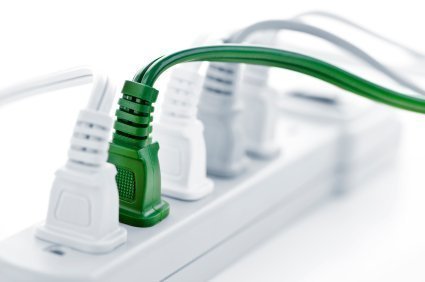Do Power Strip Surge Protectors Actually Work?
September 23, 2013

If you’re reading this, we’re guessing you just bought a brand new plasma big screen TV (or a similar expensive electrical device). So a surge protector seems like a natural purchase to protect your TV (or similar electrical appliance).
But do surge protectors actually work? Can they keep your TV from frying due to a power surge from surrounding lightning strikes (or similar causes)?
No. They can’t. We’ll explain what they’re designed to prevent and give you a much better solution for protecting your electrical appliances during a thunderstorm.
What surge protectors can and cannot prevent
Power strip surge protectors can’t absorb surges from large external forces like:
- Nearby lightning strikes that cause strong electromagnetic fields
- Damaged power lines
- Power plant issues
So if power strip surge protectors can’t prevent major power surges, what are they good for?
They’re actually very important. Power strip surge protectors protect your TV from smaller, internal fluctuations of power, like when a large appliance turns off or on. But they can’t help during large surges and they also don’t protect more expensive appliances like washing machines, dryers and air conditioners.
So what’s the solution?
You have two solutions to protect your expensive electrical goodies from these large power surges:
- Unplug everything during thunderstorms
- Install a whole-home surge protector(pictured right)--a suggestion coming from the Insurance Institute for Business & Home Safety (IBHS).
A whole-home surge protector is just like it sounds-- it protects all of the electrical equipment in your home from major power surges. It’s designed to handle larger external surges like surrounding lightning strikes.
Do I even need a power strip surge protector then?
Yes. In an ideal world, you should have both. There are small fluctuations of power that can happen in your Fort Myers home throughout the day. A whole-home surge protector doesn’t prevent those smaller surges - you need a power strip surge protector does.
Why Florida homes need all the protection they can get
So, this is good and all, but what are the chances that a major power surge will happen?
Pretty high if you live in Florida. Here’s a flash density map from the IBHS showing how exposed your home is to lightning flashes.
According to the IBHS, “Homes in areas subject to an average flash density of 10 to 14 fl/sq km/yr or greater have a severe exposure to lightning.” Looking at the map, you can see that most of Florida is in the 10-14 fl/sq km/yr range.
NOTE: A whole-home surge protector won’t protect your home from a direct lightning strike. To protect from that, the IBHS says that you’ll to “add receptors on the roof and cables that would help direct the strike away from the interior of your house.”
If you want more information on whole-home surge protectors or are interested in having one installed in your home Advanced Air can help. If you have a question, ask one of our experts.
Advanced Air has been serving Fort Myers and Naples, Florida, and the surrounding areas for over 20 years.
- Posted in:
- Electric

